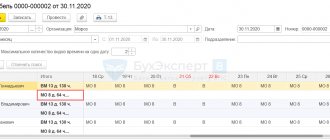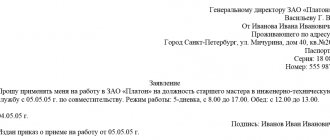Regulatory regulation of shifts: Labor Code of the Russian Federation and provisions on the rotation method of organizing work
The main sources of law regulating labor relations in which employees of enterprises perform their work on a rotation basis:
1. Chapter 47 of the Labor Code of the Russian Federation.
2. Basic provisions on the shift method of organizing work, approved. Resolution of the State Labor Committee, the Secretariat of the All-Union Central Council of Trade Unions and the USSR Ministry of Health dated December 31, 1987 No. 794/33-82 (hereinafter referred to as the Shift Regulations).
The first normative act defines:
- the essence of the rotation method of work, general regulations governing the relevant labor relations;
- restrictions on hiring workers on a rotational basis;
- duration of work on shift;
- procedure for recording working hours on shift;
- the procedure for establishing work and rest schedules;
- procedure for providing guarantees and compensation to workers on shift.
In turn, the Regulations on Shifts contain norms defining:
- the essence of work on a shift, the basic norms for regulating these legal relations;
- principles of work organization, resettlement of workers in rotational camps;
- the procedure for establishing a work and rest schedule, organizing working time recording;
- the procedure for ensuring wages, providing benefits and compensation;
- the procedure for social and welfare provision for workers, providing them with medical care;
- what enterprises can organize a shift and hire workers for it.
Many of the provisions of these sources of law coincide in essence. If discrepancies are detected between them regarding the same object of legal regulation, the norms of a later legal act - the Labor Code of the Russian Federation - should be applied, unless otherwise expressly established by law.
Also, within the framework of the relevant legal relations between employees and employers, various by-laws, methodological recommendations and clarifications from authorities may be applied.
In the Guide to Personnel Issues, ConsultantPlus experts explained in detail the features of hiring a rotation worker. To do everything right, get trial access to the K+ system and study the material for free.
Terms of payment
5.1. Remuneration for the Employee's labor under the rotation method of organizing work is made [for piece workers - for the volume of work performed according to enlarged, complex and other applicable standards and prices; temporary workers - for all actually worked time in hours based on the established tariff rates of the assigned categories; foremen, foremen, site (shift) supervisors and other line (shop) personnel directly supervising the site (site) - for all time actually worked according to the schedule (in hours) based on the established monthly official salaries. The hourly rate of employees in these cases is determined by dividing the monthly official salary by the number of working hours according to the calendar of the billing month; other managers, specialists and employees also working on shifts - for the time actually worked (in days) based on the established monthly official salaries].
5.2. For each calendar day of stay in places of work during the shift period, as well as for the actual days of travel from the location of the Employer (collection point) to the place of work and back, the Employee is paid an allowance for shift work instead of daily allowance.
5.3. For each day of travel from the location of the Employer (collection point) to the place of work and back, provided for by the shift work schedule, as well as for days of delay in travel due to meteorological conditions or the fault of transport organizations, the Employee is paid the daily tariff rate, part of the salary ( official salary) per day of work (daily rate).
5.4. Bonuses are paid to the Employee in accordance with [name of local regulation]. In this case, the bonus is accrued on wages without taking into account payment for days of inter-shift rest.
5.5. Coefficients (regional, for high mountains, desert and waterlessness) are applied to the Employee’s salary in the amounts established for employees of the main activity in the places of work.
5.6. Each day of rest in connection with overworking hours within the work schedule on a shift (day of inter-shift rest) is paid in the amount of [daily tariff rate, daily rate (part of salary (official salary)] per day of work [unless higher pay is established by a collective agreement or local regulations].
5.7. Wages are paid to the Employee [indicate specific dates of the calendar month]./Wages are paid to the Employee at least every half month on the day established by the internal labor regulations.
5.8. When performing work outside the normal working hours, at night, on weekends and non-working holidays, when combining professions (positions), when performing the duties of a temporarily absent employee, the Employee is paid appropriate additional payments in the manner and amount established by the collective agreement and local regulations.
5.9. During the period of validity of this employment contract, the Employee is subject to all guarantees and compensation provided for by the current labor legislation of the Russian Federation.
back to contents
Shift work under contract: nuances
A shift is a form of labor organization in which a person, during the period established by the employment contract, performs his labor duties at facilities located outside his place of permanent residence.
A shift should be fundamentally distinguished from a business trip (which also involves a person performing work outside his place of residence) from the point of view of:
1. Deadlines.
The duration of a business trip is not limited by law. Shifts are generally limited to 1 month of continuous work (3 if permitted by the trade union).
2. Purposes of the trip.
An employee sent on a business trip carries out a specific assignment - in accordance with the official assignment. An employee on shift performs duties under an employment contract.
3. Location of the employing organization.
The facility where the employee is on a business trip is usually located outside the location of his main job. With the shift method, the location of a person’s main job can be just the shift.
4. Employee reporting.
A person who goes on a business trip must report to the employer about the work done, as well as how the issued travel allowances were spent. An employee on a shift is generally exempt from such reporting, unless it is expressly provided for in additional agreements concluded during work on a shift (for example, this may be related to reporting on the purchase of any tools and supplies at the expense of the employer).
5. The employee’s time spent after finishing work at a remote site.
Upon returning from a business trip, a person can, unless otherwise provided by agreement with the employer, continue normal work under an employment contract. A person returning from a shift receives mandatory inter-shift rest (in many cases paid, if there are grounds) lasting at least half of the working time on shift (clause 3.2 of the guidelines of the USSR Ministry of Health dated April 25, 1988 No. 4614). He can also take advantage of the right to vacation.
6. Operating modes.
While on a business trip, a person independently determines his schedule (if the work schedule of the business traveler is not provided for by separate instructions from the employer, for example, an approved business trip plan). The main thing for him is to complete his official task. On shift, the employee works according to the schedule established by the contract.
7. Guarantees and compensation under the law.
The lists of guarantees and compensations for employees on business trips differ significantly from those that characterize the rotational method of work.
Among the main travel guarantees and compensations (not applicable during a shift) is reimbursement of personal expenses. In the case of a shift, it can also be, but in many cases it is partial (travel to the gathering place for a shift from another city may not be paid), and, moreover, rarely personalized (for example, meals can be organized in a common canteen, where it will not be possible to order meals are individual, accommodation is in a common room, not in separate rooms).
In turn, during a shift the employee is guaranteed (as opposed to going on a business trip):
- special salary bonuses;
- payment of wages taking into account northern and regional coefficients;
- additional days of vacation when working in the Far North and areas equivalent to these territories.
You can learn more about the specifics of registering an employee on a business trip in the article “Business trip order - sample in 2020.”
Subject of the agreement
1.1. Under this employment contract, the Employee undertakes to fulfill the duties of his profession/position [indicate work by position in accordance with the staffing table, profession, specialty indicating qualifications; specific type of work entrusted to the employee] at [place of work, and in the case where the employee is hired to work in a branch, representative office or other separate structural unit of the organization located in another locality, the place of work indicating the separate structural unit and its location], and The Employer undertakes to provide the Employee with the necessary working conditions provided for by labor legislation, as well as timely and full payment of wages.
1.2. Work under this agreement is the main place of work for the Employee.
1.3. The employee is involved in work on a rotation basis.
1.4. Working conditions in the workplace in terms of the degree of harmfulness and (or) danger are [optimal (class 1)/ permissible (class 2)/ harmful (specify the class and subclass of harmfulness)/ dangerous (class 4)].
1.5. The probationary period for hiring is [specify the period]./The employee is hired without a probationary period.
1.6. The employment contract is concluded for an indefinite period.
1.7. The employee must begin work on [day, month, year].
back to contents
Work on a shift basis and in a regular enterprise: restrictions
The requirements for employees when concluding an employment contract for rotational work are much stricter than for employees of ordinary enterprises. So, you cannot hire for a shift:
- minor citizens;
- pregnant women;
- women with children under 3 years of age;
- fathers raising children under 3 years of age alone;
- citizens who have medical contraindications to work on shifts - in accordance with the provisions of Order of the Ministry of Health and Social Development of Russia dated April 12, 2011 No. 302n.
The specified nuances of work on a shift are reflected in the relevant employment contract. Let's consider in what structure it can be presented.
Sample document
The maximum duration of shift work is 3 months.
In Russia, this form of labor is popular due to the developed oil and gas production in remote regions of the country. Article navigation
- When does the contract apply?
- Regulatory framework
- Recruitment restrictions
- Features of drawing up a contract
- Contents of the employment contract
- Additional documents
The employment contract for a shift worker is different from a regular one. When drawing up, you need to start from the fact that the employee will live in a temporary settlement. Shift work is typical for the mining industry, as well as housing and road construction.
Employment contract when working on a shift: document structure
The employment contract between the company organizing the work on the shift and the employee will consist of the following sections:
1. Preamble.
The wording in it will be standard - the same as in an employment contract at a regular enterprise.
2. Section with general provisions.
There should be wording here that the work is carried out on a rotational basis, indicating the location of the shift (region, municipality, facility).
The “General Provisions” of the contract also reflects the duration of the shift.
3. Section on wages.
The wages of workers on shift may be calculated (and this will be reflected in the contract):
- according to a piecework scheme;
- according to a time-based scheme;
- according to salary.
A bonus may also be awarded on earnings.
4. Section on working time and rest.
During the shift, a summarized accounting of working time should be used - including the periods when the employee is on the way from the gathering place (the location of the employing organization) to the facility where the person directly works. However, the duration of the shift cannot exceed 12 hours (clause 4.2 of the Shift Regulations).
5. Section on guarantees and compensation.
Here it makes sense to consider the wording given in Art. 302 of the Labor Code of the Russian Federation, as well as in the corresponding norms of the Regulations on Shifts.
The standard wording, which does not fundamentally distinguish a rotational employment contract from a regular one, will be the wording in the sections:
- on compulsory insurance;
- on the rights and obligations of an employee and employer;
- on the responsibility of the parties to the contract;
- on amendment and termination of the contract.
As is the case with any other agreement, the agreement in question indicates the personal data of the employee, the details of the employer, the signatures of the parties, and the seal of the employer.
When filling out an employee’s work book, a specialist from the enterprise’s personnel service must indicate in column 3 of the “Work Information” section that the employee is hired to work on a shift basis (clause 2.4 of the Shift Regulations).
The greatest number of nuances when drawing up an employment contract for a rotational shift arise, as a rule, when drawing up the section of the agreement regulating how working time and rest are organized.
Shift work - what is it?
What is a shift work method according to labor law? As Art. 297 of the Labor Code of the Russian Federation, a shift is a special type of work activity outside the place of permanent residence of employees, when the daily return of the worker to his place of registration is impossible.
It should be noted that the shift is not a business trip. A shift is considered a period that includes labor time in production, rest time between shifts, as well as hours spent on the road (Article 300 of the Labor Code of the Russian Federation).
Most often, citizens living in the provinces are offered vacancies in large cities where there is production, or in remote areas of the Far North. Previously, there was a rule according to which they paid for the entire journey to the place of work. Now the employer is obliged to pay money only for the second part of the journey - from the collection point to the actual place of work. However, there is no prohibition on reimbursement of expenses, and an employer who has the financial capacity can also pay for travel from home.
Upon arrival, workers are accommodated in dormitories or apartments provided by the company.
You can find many different offers on the Internet. Shift work requires both highly qualified specialists and ordinary workers.
In what areas can you find a job?
- logging industry;
- Oil and gas;
- mining;
- maintenance of railway transport (for example, working as a track fitter on a rotational basis).
Not only blue-collar workers can find employment.
Working as a doctor on a rotational basis is a good option for medical graduates who need experience. And in remote areas there are often not enough doctors. You can find employment in this way wherever there is a great need for workers. For example, in the capital there will always be a need for foremen, drivers, laborers, and security guards. There is also work available as a road worker on a rotational basis.
What is the reason for the popularity of the shift method? First of all, let’s note the advantages for the employer:
- it allows you to reduce the cost of transporting employees to the actual place of work;
- with its help, you can significantly speed up the construction of facilities located in remote areas;
- a well-established production process without failures or interruptions.
Now let’s talk about why such vacancies arouse great interest among job seekers. One of the reasons is high wages. In some cases, it exceeds the average for the same position in the employee’s hometown by several times. In many cases, various allowances are added to the salary, the value of which is already quite impressive. As a result, earnings become even greater.
Working time and rest under an employment contract on shift: nuances
On a shift basis, as in a regular enterprise, the standard schedule is one in which employees work 40 hours a week (5 days, 8 hours per week). A longer stay of an employee at the workplace is considered overtime, which gives him the right to paid inter-shift rest.
For example, each 12-hour shift (with a 5-day work week) will form 4 hours of corresponding rest, since it reflects the fact that the standard 8 hours with a 5-day work week are processed by 4 hours. It turns out that working two shifts lasting 12 hours will give 1 day of paid inter-shift rest in the amount of 1 shift worked.
At the same time, working standard hours forms - as is the case with any employment contract - the employee’s right to annual paid leave.
In addition, if the shift is carried out in the Far North and other preferential areas, the employee receives the right to additional paid leave.
Theoretically, overtime may occur during a shift - instead of overtime relative to the standard schedule. For example, if an employee works in a position with hazardous working conditions.
The fact is that these employees, in general, cannot work more than 36 hours a week (with agreement with the trade union and the corresponding additional payments - no more than 40). Therefore, using their labor as overtime for a relatively standard schedule is illegal.
At the same time, these workers can be involved in performing work duties in additional hours as part of overtime work - regulated by the provisions of Art. 99 Labor Code of the Russian Federation. In this case, their wages should be at least 1.5 times higher for the first 2 hours of overtime, and 2 times higher for longer overtime (Article 152 of the Labor Code of the Russian Federation).
Workers in hazardous positions, from a legal point of view, cannot “earn” themselves “extra” vacation between shifts, but they will actually be able to receive a similar - and in fact more profitable - privilege in the form of compensation for overtime work.
In the section of the employment contract under consideration, it is therefore important to reflect in detail:
- duration, intervals of the employee’s working day - taking into account weekends;
- procedure for using vacation days and inter-shift rest (mandatory and additionally paid, taking into account possible compensation for overtime work).
Employment contract with a shift worker
Employment contract
__________________ “__” ________________ ____ city _________________________________________________________________________, (name of employer) hereinafter referred to as “Employer”, represented by _____________________________ ________________________________________________________________________________, (position, full name) acting ____ on the basis of ____________________________________________, (charter, etc. .) on the one hand, and citizen <1> _____________________________________, (last name, first name, patronymic) hereinafter referred to as ____ “Employee,” on the other hand, entered into an agreement on the following:
Subject of the agreement
1.1.
The Employer undertakes to provide the Employee with work in the position of __________________, to provide working conditions <2> provided for by labor legislation and other regulatory legal acts containing labor law norms, a collective agreement (if any), agreements, local regulations and this agreement, in a timely manner and in pay the Employee wages in full, and the Employee undertakes to personally perform the functions of ___________________________________. 1.2. Work under a contract is the main one for the Employee.
1.3. The Employee’s place of work is located in the area of the rotation camp _________________ at the address: _______________________________________________.
In case of relocation of facilities where work is performed, the place of work is subject to change based on the order of the Employer <3>.
1.4. The employee reports directly to __________________________.
1.5. The Employee’s labor duties are not related to the performance of work in areas with special climatic conditions.
1.6. The employee is subject to compulsory social insurance against accidents at work and occupational diseases.
1.7. The Employee undertakes not to disclose secrets protected by law (official, commercial, other) and confidential information owned by the Employer and its counterparties.
Contract time
2.1. The Agreement comes into force from the date of its conclusion by the Employee and the Employer.
2.2. Start date: "__" _____________ ____
2.3. The contract is concluded for an indefinite period.
Conditions of remuneration of the employee. Compensation
3.1. For the performance of labor duties, the Employee is set an official salary in the amount of __________ (_______________) rubles per month.
3.2. The employer sets additional payments, allowances and incentive payments. The amounts and conditions of such additional payments, allowances and incentive payments are determined in the Regulations on bonuses for the Employee (approved by the Employer on "__" __________ ____), which the Employee was familiarized with when signing the contract.
3.3. If the Employee, along with his main job, performs additional work in another position or performs the duties of a temporarily absent employee without being released from his main job, the Employee is paid an additional payment in the amount of ___% of the salary for the main job.
3.4. Wages are paid to the Employee at the Employer's location by issuing cash at the Employer's cash desk or by transferring to the Employee's bank account.
3.5. An increase or decrease in the amount of official salary and wages in general is made on the basis of an order of the Employer and is formalized by an additional agreement to the contract.
3.6. For each calendar day of stay in the places of work during the shift period, as well as for the actual days of travel from the location of the employer (collection point) to the place of work and back, the Employee is paid in lieu of daily allowance for a rotational work method <4>.
For each day of travel from the location of the Employer (collection point) to the place of work and back, provided for by the shift work schedule, as well as for days of delay in travel due to meteorological conditions or the fault of transport organizations, the employee is paid the daily tariff rate, part of the salary ( official salary) per day of work (daily rate).
Working hours. Vacations
4.1. The shift includes the time spent performing work on site and the rest time between shifts.
The normal duration of a shift is ____ (no more than a month) days.
4.2. The employee is provided with a summary record of working time for the month (quarter, year, etc.).
The accounting period covers all working time, travel time from the location of the Employer or from the collection point to the place of work and back, as well as rest time falling within a given calendar period of time.
The Employer keeps records of the working time and rest time of each employee working on a rotational basis, by month and for the entire accounting period.
4.3. Working hours <5> and rest time within the accounting period are regulated by the shift work schedule, which is approved by the Employer taking into account the opinion of the elected body of the primary trade union organization in the manner established by Art. 372 of the Labor Code of the Russian Federation for the adoption of local regulations, and is brought to the attention of the employee no later than two months before its entry into force.
The schedule includes the time required to transport the Employee to and from the shift. Days spent traveling to and from work are not included in working hours and may fall on inter-shift rest days.
4.4. In exceptional cases, at individual sites, the duration of the shift can be increased by the employer to three months, taking into account the opinion of the elected body of the primary trade union organization in the manner established by Art. 372 of the Labor Code of the Russian Federation for the adoption of local regulations).
4.5. Each day of rest in connection with overworking hours within the work schedule on a shift (day of inter-shift rest) is paid in the amount of the daily tariff rate, daily rate (part of the salary (official salary) for the day of work), unless higher payment is established by the collective agreement, local regulations or employment contracts.
Hours of overtime within the work schedule on a shift, not multiples of a whole working day, can be accumulated over the course of a calendar year and summed up to whole working days, with the subsequent provision of additional days of inter-shift rest.
4.6. The annual basic paid leave is granted to the Employee for a duration of 28 calendar days.
The right to use vacation for the first year of work arises for the Employee after six months of his continuous work with this Employer. By agreement of the parties, paid leave may be provided to the Employee before the expiration of six months.
Leave for the second and subsequent years of work may be granted at any time of the working year in accordance with the order of provision of annual paid leave established by the given Employer.
4.7. For family reasons and other valid reasons, the Employee, based on his written application, taking into account the shift work schedule, may be granted leave without pay for the duration established by the labor legislation of the Russian Federation and the Internal Labor Regulations of the Employer.
4.8. In case of incomplete work time in the accounting period or on shift (vacation, illness, etc.), working hours according to the calendar falling on days of absence from work are deducted from the established norms of working hours.
4.9. In case of overtime in excess of the normal working hours (shift or accounting period) provided for by the schedule, overtime work is paid according to the rules of Art. 152 of the Labor Code of the Russian Federation.
At the request of the employee, overtime work, instead of increased pay, can be compensated by providing additional rest time, but not less than the time worked overtime.
Rights and responsibilities of an employee
5.1. Job responsibilities of Employee <6>:
5.1.1. _________________________________________________________________.
5.1.2. ________________________________________________________________.
5.1.3. ________________________________________________________________.
5.1.4. Careful attitude towards the property of the Employer (including the property of third parties held by the Employer, if the Employer is responsible for the safety of this property) and other employees.
5.1.5. Immediately informing the Employer about the occurrence of a situation that poses a threat to the life and health of people, the safety of the Employer’s property (including the property of third parties held by the Employer, if the Employer is responsible for the safety of this property).
5.2. The employee has the right to:
amendment and termination of the contract in the manner and under the conditions established by the Labor Code of the Russian Federation and other federal laws;
providing him with work stipulated by the contract;
timely and full payment of wages in accordance with their qualifications, complexity of work, quantity and quality of work performed;
rest provided by the establishment of normal working hours, reduced working hours for certain professions and categories of workers, provision of weekly days off, non-working holidays, paid annual leave;
professional training, retraining and advanced training in the manner established by the Labor Code of the Russian Federation and other federal laws;
association, including the right to create trade unions and join them to protect their labor rights, freedoms and legitimate interests;
participation in the management of the organization in the forms provided for by the Labor Code of the Russian Federation, other federal laws and the collective agreement (if any);
conducting collective negotiations and concluding collective agreements and agreements through their representatives, as well as information on the implementation of the collective agreement (if any), agreements;
protection of your labor rights, freedoms and legitimate interests by all means not prohibited by law;
resolution of individual and collective labor disputes, including the right to strike, in the manner established by the Labor Code of the Russian Federation and other federal laws;
compensation for damage caused to him in connection with the performance of his job duties, and compensation for moral damage in the manner established by the Labor Code of the Russian Federation and other federal laws;
compulsory social insurance in cases provided for by federal laws.
Rights and obligations of the employer
6.1. The employer has the right:
change and terminate the contract with the Employee in the manner and on the terms established by the Labor Code of the Russian Federation and other federal laws;
encourage the Employee for conscientious, effective work;
require the Employee to fulfill his job duties and take care of the property of the Employer (including the property of third parties owned by the Employer, if the Employer is responsible for the safety of this property) and other employees, and to comply with internal labor regulations;
bring the Employee to disciplinary and financial liability in the manner established by the Labor Code of the Russian Federation and other federal laws;
adopt local regulations.
6.2. The employer is obliged:
comply with labor legislation and other regulatory legal acts containing labor law norms, local regulations, and the terms of the collective agreement (if any);
provide the Employee with work stipulated by the contract;
ensure safety and working conditions that comply with state regulatory requirements for labor protection;
provide the Employee with equipment, tools, technical documentation and other means necessary to perform work duties;
provide the Employee with equal pay for work of equal value;
pay the full amount of wages due to the Employee within the time limits established in accordance with the Labor Code of the Russian Federation, the collective agreement (if any), and internal labor regulations;
conduct collective negotiations, as well as conclude a collective agreement in the manner established by the Labor Code of the Russian Federation;
provide the Employee's representatives with complete and reliable information necessary for concluding a collective agreement, agreement and monitoring their implementation;
acquaint the Employee, against signature, with the adopted local regulations directly related to his work activity;
timely comply with the instructions of the federal executive body authorized to carry out state supervision and control over compliance with labor legislation and other regulatory legal acts containing labor law norms, other federal executive bodies exercising control and supervision functions in the established field of activity, pay fines, imposed for violations of labor legislation and other regulatory legal acts containing labor law norms;
consider submissions from the relevant trade union bodies and other representatives elected by the Employee about identified violations of labor legislation and other acts containing labor law norms, take measures to eliminate the identified violations and report the measures taken to the specified bodies and representatives;
create conditions that ensure the Employee’s participation in the management of the organization in the forms provided for by the Labor Code of the Russian Federation, other federal laws and the collective agreement (if any);
carry out compulsory social insurance of the Employee in the manner established by federal laws;
compensate for harm caused to the Employee in connection with the performance of labor duties, as well as compensate for moral damage in the manner and under the conditions established by the Labor Code of the Russian Federation, other federal laws and other regulatory legal acts of the Russian Federation;
perform other duties provided for by labor legislation and other regulatory legal acts containing labor law standards, a collective agreement (if any), agreements, and local regulations.
Conditions for additional employee insurance
7.1. The employee is subject to additional insurance in the manner and on the terms established by the collective agreement (if any), agreements of the parties and the current legislation of the Russian Federation.
Safe work practices training
8.1. Upon admission to work, the Employer provides training to the Employee in safe methods and techniques for performing work with an internship at the Employer’s location, passing exams (tests) and conducting periodic training on labor protection, testing knowledge of labor protection requirements during the work period.
8.2. The employee is provided free of charge with certified special clothing, special shoes and other personal protective equipment, as well as flushing and (or) neutralizing agents in accordance with standard standards, which are established in the manner determined by the Government of the Russian Federation.
8.3. The employer, at his own expense, is obliged, in accordance with established standards, to ensure the timely issuance of special clothing, special footwear and other personal protective equipment, as well as their storage, washing, drying, repair and replacement.
Responsibility of the parties
9.1. A party to a contract guilty of violating labor legislation and other regulatory legal acts containing labor law norms is liable in cases and in the manner established by the Labor Code of the Russian Federation and other federal laws.
Termination of the contract
10.1. Termination of the contract is formalized by order (instruction) of the Employer on the grounds provided for by the current legislation of the Russian Federation.
10.2. The Employee must be familiarized with the employer's order (instruction) to terminate the contract against signature. At the request of the Employee, the Employer is obliged to provide him with a duly certified copy of the specified order (instruction). If the order (instruction) on termination of the contract cannot be brought to the attention of the Employee or the Employee refuses to familiarize himself with it against signature, a corresponding entry is made on the order (instruction).
10.3. The day of termination of the contract in all cases is the last day of work of the Employee, with the exception of cases when the Employee did not actually work, but in accordance with the Labor Code of the Russian Federation or other federal law, his place of work (position) was retained.
10.4. On the day of termination of the contract, the Employer is obliged to issue the Employee a work book and make payments to him in accordance with Art. 140 of the Labor Code of the Russian Federation. Upon written application by the Employee, the Employer is also obliged to provide him with duly certified copies of documents related to work.
Final provisions
11.1. The terms of the agreement are confidential and are not subject to disclosure.
11.2. The terms of the agreement are legally binding for the parties from the moment it is concluded by the parties. All changes and additions to the agreement are formalized by a bilateral written agreement.
11.3. Disputes between the parties arising during the execution of the contract are considered in the manner established by the current legislation of the Russian Federation.
11.4. In all other respects that are not provided for in the contract, the parties are guided by the legislation of the Russian Federation governing labor relations.
11.5. The agreement is drawn up in two copies having equal legal force, one of which is kept by the Employer and the other by the Employee.
Details of the parties
12.1. Employer: _____________________________________________________
Address: __________________________________________________________________
INN/KPP ___________________________/____________________________________
Account account __________________________ in __________________________________________
BIC _____________________________________________________________________
12.2. Worker: ________________________________________________________
Passport: series ____ number _________ issued ______________________________
“__” _____________ ____ city, department code ______________________________,
registered at the address: __________________________________________.
Account account __________________________ in __________________________________________
BIC _____________________________________________________________________.
Signatures of the parties:
Employer: Employee: __________/________________ _________________________________
M.P.
———————————
<1> Taking into account Art. Art. 298 and 264 of the Labor Code of the Russian Federation (hereinafter referred to as the Labor Code of the Russian Federation, Labor Code of the Russian Federation) and Appendix 2 to Order of the Ministry of Health and Social Development of Russia dated August 16, 2004 N 83.
<2> Taking into account Art. 297 Labor Code of the Russian Federation, section. 2, 6, 8 Resolutions of the State Committee for Labor of the USSR, the Secretariat of the All-Union Central Council of Trade Unions, the Ministry of Health of the USSR dated December 31, 1987 N 794/33-82 “On approval of the Basic Provisions on the Shift Method of Organizing Work” (hereinafter referred to as the Resolution on the Shift Method of Organizing Work).
<3> In accordance with paragraph. 2 clause 1.1 of the Resolution on the shift method of organizing work.
<4> Peculiarities of payment for organizations financed from the budget and employees traveling to perform work on a rotational basis in the regions of the Far North and equivalent areas are established by Art. 302 of the Labor Code of the Russian Federation.
<5> Taking into account clause 4.3 of the Resolution on the shift method of organizing work, part 5 of Art. 103 Labor Code of the Russian Federation.
<6> Taking into account Art. Art. 57 and 143 of the Labor Code of the Russian Federation and the Procedure for applying the Unified Qualification Directory of Positions of Managers, Specialists and Employees (approved by Resolution of the Ministry of Labor of Russia dated 02/09/2004 N 9).
Results
Work on a rotational basis is a type of labor legal relationship, regulated by several sources of law at the level of federal legislation, the main of which are Chapter 47 of the Labor Code of the Russian Federation and the Basic Provisions on the rotational method, adopted by Soviet departments. When drawing up an employment contract for shift work, special attention should be paid to determining the procedure for calculating wages, reflecting the work schedule and the procedure for using employee rest days.
You can learn more about the various nuances of labor relations with a rotational method of organizing work in the articles:
- “Vacation in the Far North - what is the duration?”;
- “Is it necessary to levy personal income tax on the cost of travel of a rotation worker from his place of residence to the collection point or to the place of work (shift)?”
You can find more complete information on the topic in ConsultantPlus. Free trial access to the system for 2 days.
Compensation and allowances for shift work
As a rule, employers make compensation payments to shift workers - payment for travel from the place of assembly/place of residence to the place of work and back (tickets) and days of travel (tariff or average daily earnings for days on the road). An enterprise can reimburse the cost of travel, or it can issue tickets to its employees, purchasing them centrally from transport companies.
The shift allowance replaces daily travel allowances. The bonus for working on a shift basis is calculated for all days of the shift and for the days the employee is on the road on the way to the shift and back. The amount of allowances at commercial enterprises is established by collective agreement. For state-owned enterprises, there are regulations establishing the amount of allowances.
Industry standards must be taken into account when calculating salaries. Especially if the company is a party to an industry agreement. If such an agreement is not signed by the enterprise, it may be equal to the norms of industry standards, but they will not be binding for the enterprise.
The amount of the bonus for shift work can be set:
- as a percentage of the salary (tariff rate);
- in a fixed amount.
Work and rest schedule
4.1. The duration of working hours, the beginning and end of the working day, breaks for rest and meals and other issues of work and rest are determined by the Internal Labor Regulations and other local regulations of the Company.
4.2. The duration of the shift for the Employee is set at 15 (Fifteen) days.
Expert opinion
Kuzmin Ivan Timofeevich
Legal consultant with 6 years of experience. Specializes in the field of civil law. Member of the Bar Association.
4.3. An employee has the right to annual leave while maintaining his place of work (position) and average earnings. The duration of the Employee's annual basic paid leave is 28 calendar days.
4.4. Additional paid holidays and other holidays are provided to the Employee in the manner and on the terms determined by regulatory legal acts containing labor law norms, as well as by the Collective Agreement and local legal acts of the Company in the amount of:
- for work in areas equated to the regions of the Far North - 16 calendar days;
- for hard work, work with harmful and (or) dangerous working conditions - in accordance with the Collective Agreement;
- for irregular working hours - in accordance with the Collective Agreement.
When does the contract apply?
The use of a shift method of labor organization is justified when an employee needs to spend more than three hours to get to the site. This form of work is similar to business travel, but the shift has a fundamental difference: workers live in small temporary towns or other housing rented by the employer.
Such a trip can last up to a month, and in special cases provided for by law, up to three. To increase the length of stay at the site, a local level normative act is drawn up, which is approved by the trade union.
Other terms of the Agreement
9.1. An employee is obliged to keep a trade secret (confidential information that allows its owner to increase income, avoid unjustified expenses and maintain his position in the market, which has actual or potential commercial value due to its unknownness to third parties, to which there is no free access legally and in in respect of which the owner of such information has introduced a trade secret regime), which has become known to him by the nature of his activity or in any other way.
Regulatory framework
The provisions that regulate the relationship between the employer and the employee under the rotational method of organizing work in 2021 contain the following regulations:
- Labor Code of the Russian Federation;
- Shift regulations approved in 1987.
Sometimes it is difficult for an employer to determine whether it is worth using the rotation method. In the Labor Code you can find a list of organizations for which, in the opinion of the drafters, it is advisable to use this method of organizing work.
An employer can send one employee, a group or the entire team on shift.
Recruitment restrictions
The rotational method is not suitable for everyone. A list of restrictions has been included in the Labor Code. According to the law, the following cannot work on shift:
- young people who have not reached the age of majority;
- women during pregnancy;
- mothers with children under 3 years old;
- fathers and guardians of children under 3 years of age who are raising children without their mother.
In addition, an employment contract for those working on a rotational basis is concluded only after passing a medical examination. An examination by a doctor is a mandatory condition for those who get a job as a shift worker. The employer does not have the right to hire people with medical contraindications.








